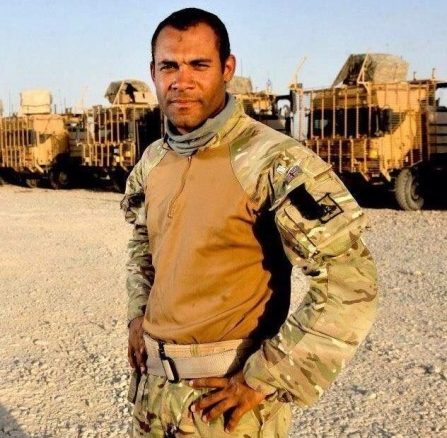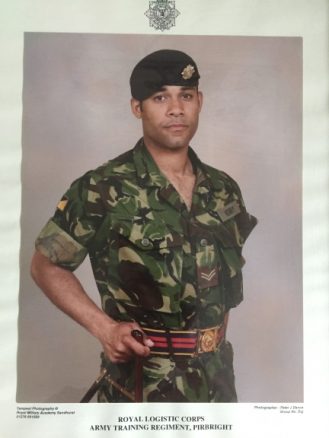
Hi Steven, thanks for talking to us. October is obviously Black History Month here in the UK, what does it mean for you?
Hi, pleasure to talk to you. I am immensely proud of my heritage, personally, Black History Month allows me time to reflect on all those achievements we have made throughout the years. I am still amazed and utterly inspired by what has been achieved by black service personnel throughout history.
So, you are currently a Captain in the Royal Logistics Corp here in the UK. When did you join the Army, and what made you join?

I joined the Army 20 years ago. But believe me it has gone by in a flash. I always knew I had more to offer, but I didn’t have the grades for University. I was always fit and active and I hated being stuck indoors. The Army seemed like the most natural progression for me. Even as a 19 year old who thought he had the world figured out I knew there was more out there.
Twenty years is a long time, what makes you stay in the Army?
Easy, the life style! It’s a crazy concept but for 20 years I have been paid to stay fit, work with some of the most loyal, trust worthy and honest friends anyone could hope for. I have amassed an entire CV of qualifications, qualifications that are highly sought after in ‘civvy street’. At 20 years old I was qualified to drive a HGV and it cost me absolutely nothing. By 25 I had retaken all of my GCSE’s and got better grades that I ever did at school. The best thing was I had done all this with my mates.
What did your family think about you joining the Army?
My family were and still are very supportive of me. My mother is so patriotic; she was over the moon when I made the decision to join up. When I received the award for best recruit at the end of my basic training they all knew I had finally found myself.
What achievement are you most proud of during your career?
When I was a Staff Sergeant I was employed as an Officer Cadet Instructor at the Royal Military Academy Sandhurst. I took a Platoon of Officer Cadets through training from day 1 until the day they were commissioned. Watching them proudly walk up the stairs in to Old College as Officers in the British Army, knowing that I had trained them is still one of the best memories and achievements I have.
What has been the most important skill you have learnt?
Team work, in the Army you are never on your own. You have an entire team of friends around you. These are people that you eat with, play sports with, socialise with, learn with and train with even do your laundry with. Listening to others and hearing what they have to say I so important in life. I said earlier that I thought I had the world figured out when I was 19. I didn’t. I didn’t listen to anyone or anything. The Army teaches you that everyone has an opinion and providing you share it in the right way your point of view will be heard.
Some people may have a perception about how about how black young people are treated in the Army. What has your experience been?
When I joined the Army in 1997; I was gobby, loud and arrogant. Basic training put me in my place. I won’t lie to you, there has been the odd comment and remark over the years but it’s not what people say that matters it’s how you retaliate that counts. I remember once someone said to me, ‘you’re black you should be able to run fast’. My reply, ‘being black doesn’t make me run fast, being fitter than you does!’ Today remarks like that would not need to be commented on because they wouldn’t be made in the first place. We live our lives by what we call “Core Values and Standards”. One of those principles is “Respect for Others” which means that we treat people as they wish to be treated not how you think they should be treated.
Thank you for your time Steven! As a final thing, what piece of advice would you give the 18 year old you?
If you truly believe that you are made for something more, then just go for it. If you are happy to settle for a job few prospects, then crack on! But I’d rather look back and be proud of what I have achieved. Wouldn’t you?
To learn more about life in the British Army, take a look at http://www.army.mod.uk
